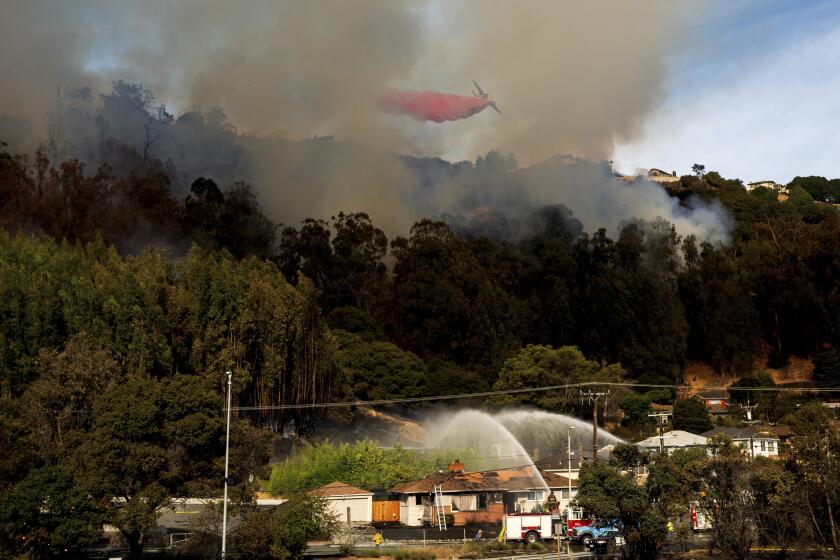Norwalk Budgets $11,000 to Help Illegals Win Amnesty
At a time when illegal immigrants reportedly have few places to turn for help in Southeast Los Angeles County in seeking permanent legal status, Norwalk has taken an unusual step to deliver some quick relief.
The City Council has earmarked in its newly adopted 1987-88 budget $11,000 for a nonprofit legal-aid group that is assisting aliens applying for residency under the national amnesty program.
Local immigrants’ rights advocates say the grant is a breakthrough of sorts because it marks a rare step forward in efforts to provide low-cost legal advice for undocumented immigrants by taking advantage of a one-time opportunity to remain here permanently. Since the law went into effect May 5, immigration officials and amnesty attorneys say there has been an acute shortage of local volunteers to help amnesty seekers complete the extensive paper work.
But officials say they hope the Norwalk grant to Community Legal Services of Norwalk will prompt others to do the same.
Dan Verches, director of government affairs for United Way and an official with a large immigrants’ rights group in Los Angeles County, said he believes Norwalk is the first city in the state to specifically allocate money for an amnesty-related program.
“Norwalk will be viewed as a trend setter, responding directly to the needs of a large segment of its community,” said Verches, staff coordinator for the Coalition for Humane Immigration Rights of Los Angeles, an umbrella organization made up of 44 service, volunteer and religious groups. “Hopefully, this will light a fire under others to jump in and help people wade through the amnesty process. We need it. . . . “
That help, he said, is particularly needed in the county’s southeast corner, which has a heavy concentration of Latinos, many in the United States illegally. But immigration officials, attorneys and community leaders say few organizations in the area have stepped forward to assist amnesty candidates complete the paper work necessary to win a permanent home here.
Only a few churches and service groups have taken on the time-consuming task, so many illegal aliens have been forced to seek help from public agencies outside the area or pursue private channels, like attorneys who, in some cases, are charging up to $1,000 or more for advice. Still others unable to find assistance simply have not applied for amnesty--a move that attorney Robert Cohen and others predict could prove tragic when the amnesty offer ends next May.
“My great fear is that lots of people can’t get the help they need so they are waiting until the last minute to file when the numbers will be too great to cope with,” said Cohen, director of the Legal Aid Society of Orange County, which offers free legal advice to low-income and poor people. Cohen, whose group also runs Community Legal Services of Norwalk and a similar office in Compton, added: “I’m afraid a lot of people are going to miss a wonderful chance to remain here, clear and free.”
To reach more people, Graciela Zavala, an attorney in Cohen’s group specializing in the amnesty program, said the $11,000 grant from Norwalk will underwrite a series of “self-help clinics” for illegal immigrants beginning in August. At the sessions, Zavala said, amnesty applications will be explained and questions about the documentation required and where to obtain it will be covered.
Staff to Be Hired
The money, she said, also will be used to hire additional staff for the Norwalk office to handle amnesty-related issues.
“This is a very, very big step forward,” Zavala said. “Thousands of people have not come in because they don’t understand the system. We hope to change that.”
To be eligible for amnesty, aliens must prove that they have lived continuously in the United States since before Jan. 1, 1982. While a strict reading of the law disqualifies aliens who left the country and re-entered with legal visas, thus breaking the continuous illegal residency requirement, some immigrants’ rights groups contend that Congress never to deny amnesty to such aliens. The matter is currently being reviewed by INS officials in Washington and a ruling clarifying the issue is expected sometime next month, an INS spokesman in Los Angeles said.
An estimated 750,000 illegal immigrants live in Los Angeles County, Verches said. So far more than 80,000 aliens have filed for amnesty in the Los Angeles area, but only two immigrant families--one from Thailand, the other from El Salvador--have gained legal status through the landmark program.
In Norwalk, the largest city in the Southeast county area, about 44% of the city’s 89,000 residents are Latino. Zavala estimated about 2,000 to 3,000 are illegal.
Grace Napolitano, one of two Latinos on the Norwalk City Council, said it is important to the city’s future to help those people become legal.
“If we can make them into legal, productive people it will be a benefit to the city,” she said. “They can contribute and participate openly in our city and its growth.”
City Jumps at Chance
Diane Hutson, Norwalk’s social services coordinator, said the city is not in a position to work directly with aliens seeking amnesty. So when Zavala asked for financial aid, Hutson said the city jumped at it.
“We didn’t feel that we’re equipped, with our current caseload and work, to take on this chore,” she said. “But we recognize there is a tremendous need.”
Because of staff and budget constraints, Cohen said, his group is limited to handling only the most difficult amnesty cases, usually the ones that are turned down and then appealed to the Immigration and Naturalization Service. That is why earlier this year Cohen’s group began contacting dozens of local organizations and churches in the southeast Los Angeles County area, asking if they would act as “amnesty clearinghouses,” disbursing applications and answering questions.
The results were disappointing, particularly in an area where nearly every city has reported an increase in its ethnic and immigrant populations since the 1980 census.
In fact, Latinos now make up more than 50% of the population in 11 Southeast-area cities.
“It was incredible,” said Rita Canales, a paralegal in the Compton legal-aid office. “We hit a dry well everywhere we went.”
Most groups, she said, pointed to money troubles and staff shortages as resons why they could offer no assistance. With the end of federal revenue sharing, she said cities have cut funding to many of the local social groups that might have assisted amnesty applicants. “They don’t even have the money to keep their doors open in some cases,” she said, “much less start something new.”
More to Read
Sign up for Essential California
The most important California stories and recommendations in your inbox every morning.
You may occasionally receive promotional content from the Los Angeles Times.










